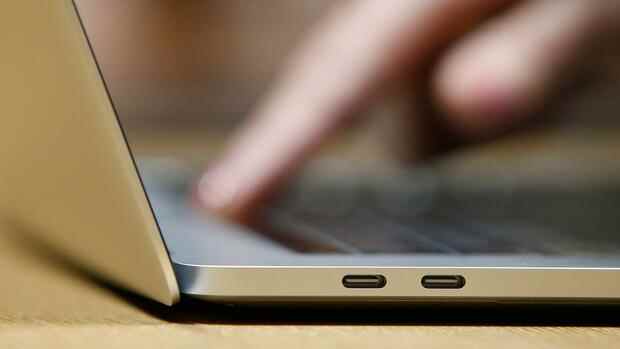It still needs to be clarified whether laptops must also be able to be charged via USB-C.
(Photo: dpa)
Brussels The European Parliament wants portable electronic devices to be generally charged via USB-C. This is intended to avoid electronic waste, while at the same time making it easier for users to find suitable chargers.
At a minimum, cell phones, tablets, digital cameras, headphones, headsets, portable video game players and portable speakers would be affected by the law. In order for the proposal to become law, Parliament must now negotiate with the Council of EU Member States.
However, the proposal adopted there is congruent in many respects. If negotiations are completed by the summer, the USB-C requirement could come in mid-2024.
It still needs to be clarified whether laptops must also be able to be charged via USB-C. This is what the parliamentary proposal that has now been approved provides for. MEPs also want to include e-readers, earbuds, keyboards, mice, portable screens, portable printers, portable navigation devices, digital radios and electronic toys.
Top jobs of the day
Find the best jobs now and
be notified by email.
Also in the proposal are smartwatches, wearables, health trackers, personal care devices, sports equipment, lamps. However, these should only be affected if they are large enough for a USB-C connection.
In any case, the USB-C standard has become more and more established in recent years and has also pushed back the previously dominant micro-USB standard. However, one manufacturer has another charging option on offer: Apple.
Apple tries to prevent law
The US company has tried vehemently to prevent the law. After the EU Commission presented its proposal last year, Apple warned of an obstacle to innovation if manufacturers were no longer allowed to decide on the connections on their devices themselves.
Inside Valley: This is what Apple does with old iPhones
Apple’s iPhones continue to charge using Lightning connectors developed in-house, while other products like iPads and Macbooks have USB-C connectors.
The EU expects more convenience for users and less e-waste from standardization. Half a billion chargers are currently sold in Europe every year, resulting in 11,000 to 13,000 tons of electronic waste, said Social Democrat Alex Agius Saliba, who is jointly responsible for the law in the European Parliament.
>> Read here: Apple increases recycled content to 20 percent
“A unified charger for cellphones and other small and medium-sized electronics helps the environment, encourages the reuse of old electronics, saves money and reduces unnecessary costs and inconveniences for businesses and consumers,” he said.
“The uniform charging cable is a perfect example of how high consumer protection goes hand in hand with combating the climate crisis,” said committee chairwoman Anna Cavazzini (Greens).
The parliamentary proposal also provides for the creation of uniform standards for wireless charging. In addition, it is planned that devices must always be offered without a charging cable. Environmentalists like Cavazzini had advocated that the device and cable should no longer be sold as a set.
More: The years of electronics boom is coming to an end
